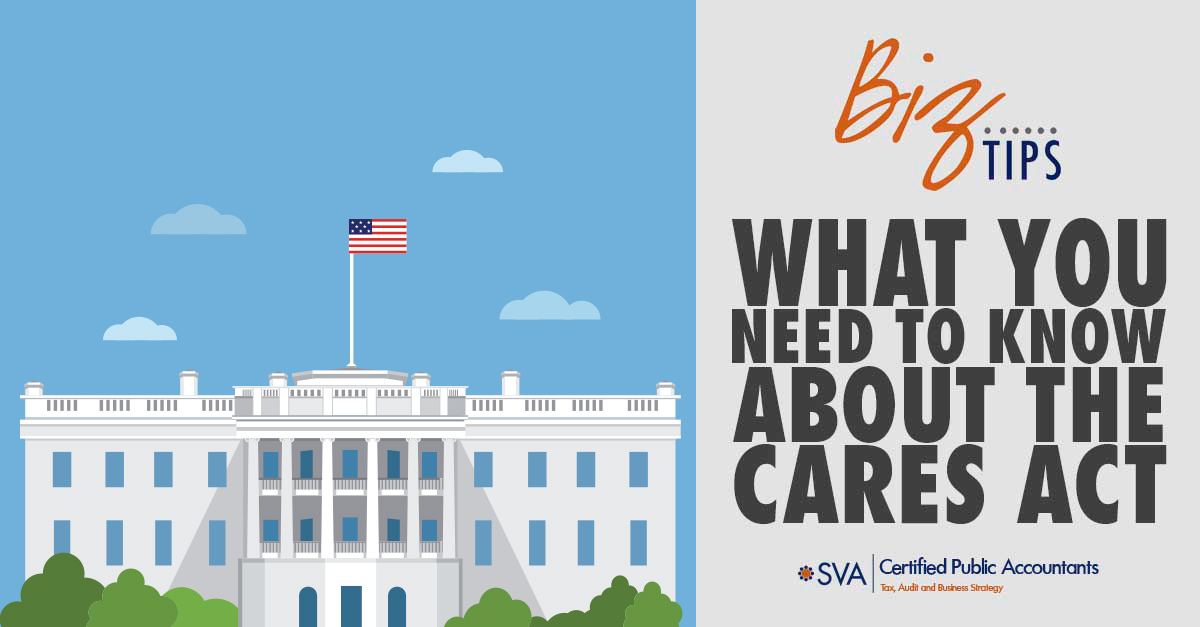On March 25, 2020, the U.S. Senate passed the Coronavirus Aid, Relief and Economic Security Act (CARES Act), a massive $2 trillion bill with an array of significant tax-saving provisions that impact both individuals and businesses and hopefully create needed cash flow.
The CARES Act also could affect prior tax years. It was subsequently passed by the U.S. House of Representatives and signed by the President.
Individual Provisions
Cash Payments
The CARES Act provides for payments to individuals of up to $1,200 per person ($2,400 for a married couple) with an additional $500 for each qualifying child. The payment is subject to a phase-out for individuals with adjusted gross income over $75,000 and married persons filing jointly with AGI above $150,000. The amount of the payment is reduced by $5 for each $100 in income above the applicable threshold.
Nonresident alien individuals, individuals who are dependents of another, and estates or trusts are ineligible for the payment.
Payments will generally be based on 2018 tax return information. However, like the advanced tax premium credit under the Affordable Care Act, there is a true-up for the amount for which one is eligible on the filing of the 2020 tax return.
Retirement Fund Rules
In order to generate access to cash for individuals, the bill liberalizes the retirement plan rules, for 2020, dealing with premature distribution penalties, plan loans and required minimum distributions (RMDs).
The 10% premature early withdrawal penalty is waived for distributions of up to $100,000 from qualified retirement accounts and individual retirement accounts for coronavirus-related purposes. Additionally, the federal income tax on such distributions can be paid over a three-year period. The law also provides that these distributions can be recontributed back to the plan within a three- year period without affecting that year’s contribution cap.
The bill provides more flexible rules concerning loans from certain retirement accounts for coronavirus-related relief. The maximum amount of loans (when combined with existing loans) which can be taken from the plan is the lesser of $100,000 (up from $50,000) or 100% of the participant’s accrued benefit (up from 50%). In addition, there is a delay in the starting date of loan repayments back to the plan.
The bill also temporarily waives the required minimum distribution requirement from the plan for 2020. This permits those who do not need immediate funds to avoid cashing out investments at a low value.
A coronavirus-related distribution is one made to an individual where 1) he/she, a spouse or a dependent is diagnosed with COVID-19; or 2) the individual suffers adverse financial consequence due to being quarantined, furloughed, laid off, having work hours reduced, closing or reducing a business owned or operated by that person due to COVID-19, or other factors to be determined by Treasury. The qualified plan can accept an employee certification that this condition is satisfied. A single $100,000 limit applies to distributions by plans of a controlled group of businesses.
Charitable Contributions
Up to $300 of cash contributions for 2020 will be allowed for contributions to charities, whether the taxpayer itemizes or not, in determining adjusted gross income.
Additionally, an individual can elect to have the 50% of AGI limit not apply in 2020 for certain qualified contributions. However this does not apply to contributions to certain non-operating private foundations or amounts to establish or maintain a donor advised fund.
The limitation for C corporations, normally subject to a 10% of taxable income limit, is raised to 25% of taxable income.
The limitation on deductions for contributions of food inventory is increased from 15% to 25%.
Employer Payment of Student Loans Education Assistance Program
IRC Sec 127(c) of the Code is amended to include as a nontaxable employer-provided educational assistance program any payment of principal or interest made before January 1, 2021 (whether paid to the employee or a lender).
Business Provisions
Employee Retention Credit for Employer Subject to Closure Due to COVID-19
An eligible employer is allowed a credit against applicable employment taxes for each calendar quarter equal to 50% of qualified wages for each employee for such calendar quarter.
- The amount of qualified wages for any employee taken into account by an employer for all calendar quarters is limited to $10,000.
- The credit is limited to the employment taxes owed as reduced by other credits (including the Sick Leave and Family and Medical Leave credits under the Families First Coronavirus Response Act) for all employees of the eligible employer for such calendar quarter. If the employee retention credit exceeds this amount, the difference is an overpayment which can be refunded.
An eligible employer is one who (a) was carrying on a trade or business during the calendar year 2020; (b) with respect to any calendar quarter for which (i) operations are fully or partially suspended due to orders from an appropriate government authority limiting commerce, travel, or group meeting due to COVID-19 or (ii) in which (beginning in first calendar quarter after 12/31/2019) there has been a significant decline in gross receipts (i.e., less than 50% gross receipts for same quarter in prior year and ending with calendar quarter for which gross receipts are greater than 80% same calendar quarter in prior year. Tax-exempt organizations can also benefit from this credit.
Employer and Self-Employer Individual Deferral of Payroll Taxes
Employers and self-employed individuals can defer the payment of the employer portion of employment taxes or self-employment taxes due during the “payroll tax deferral period” to December 31, 2021, and December 31, 2022. 50% of the deferred taxes will be required to be paid on these dates. Penalties will not apply for failure to make timely deposits for withholding these amounts.
The Payroll Tax Deferral Period is defined as the period beginning on date of enactment to January 1, 2021. This does not appear to be retroactive to January 1, 2020.
Net Operating Loss (NOL) Rules are Relaxed
Many of the rules limiting the use of net operating losses under the Tax Cuts and Jobs Act (TCJA) are suspended under the Stimulus Bill.
• NOLs from 2018, 2019 or 2020 are eligible to be carried back for five years.
• Additionally, the 80% limit on use of NOL carryforwards is also temporarily removed so that the NOL can fully offset income.
Those impacted by this rule should seek to carry back available losses to obtain refunds.
Limitation of Individuals' Use of Business Losses
Under the TCJA, non-corporate taxpayers’ net business losses were limited under IRC section 461(l) to $250,000 ($500,000 for a joint filer). The Stimulus Bill would permit use of net business losses without limit for the 2018 tax year through 2020. If you were limited in the use of carryover used in 2018, this can produce a refund opportunity.
Corporate Alternative Minimum Tax Credit Refund
Under the TCJA, a C corporation with alternative minimum tax credits was entitled to a refund of these credits over a four-year period — 2018, 2019, 2020 and 2021. Under the Stimulus Bill, the corporation can receive the refund over a two-year period 2018 and 2019. Furthermore, if there will be any delay in filing the 2019 C corporation return, an election can be made to include the entire refundable amount in 2018.
Business Interest Limitation Under IRC Section 163(J)
The TCJA includes a limitation on the use of net business interest expense to 30% of Adjusted Taxable Income. The Stimulus Bill amends this rule for 2019 and 2020 and increases the limit from 30% of Adjusted Taxable Income to 50%. Additionally, since it is likely that 2020 income will be lower than 2019 due to the current economic circumstance, an election can be made to use the 2019 Adjusted Taxable Income for the 2020 tax year.
Bonus Depreciation Allowed on Qualified Improvement Property (QIP)
The Tax Cuts and Jobs Act intended to permit immediate write-off of costs related to Qualified Improvement Property. Due to a drafting error, this provision was not put into that legislation and caused QIP only to be eligible for depreciation over 39 years. The Stimulus Bill fixes this drafting error and specifically permits bonus depreciation to be taken on qualified costs retroactively. This allows amendment of 2018 and 2019 filed returns and provide a source of cash, particularly for those in the hospitality industry.
Excise Tax Exemption
The bill also provides a temporary exception from excise tax on alcohol which is used to produce hand sanitizer. We are waiting to see if the House of Representatives will make any substantive changes to these provisions. Clearly, they are all intended to provide additional cash to taxpayers.
As the COVID-19 crisis continues to unfold, we will continually monitor the situation and tax matters surrounding it and provide timely updates as information becomes available.

© 2020 CPAContentPlus

